- Details
Every year AFAM Community Manager spends one week in France on school’s campuses to meet students, faculty and staff members and inform them about AFAM’s activities and our Shasta program.
This time my visit was pleasant and productive and has led me to Atlanta, Paris, Bordeaux and then Aix-en-Provence.
Sunday, Nov. 2, Atlanta
It was not that hot in Atlanta and it was raining (Hotlanta – is the ads you see when you arrive at the airport -referring to climate as well as leisure destination). But a welcome received from our students in this home of Georgia Tech was nice and warm. We went to Nicolas Horde’s (AFAM representative in Atlanta) favorite bar – LadyBird Grove and Mess Hall in Atlanta Beltline’s Eastside for a community brunch.
Most of our members in Atlanta are Georgia Tech students. Georgia Institute of Technology is being for several years one of the most attractive academic destinations for our students in the USA. The conversation around the table was engaging and dealt with different subjects such as Parcours US program, life in Atlanta, Shasta program, to mention a few.
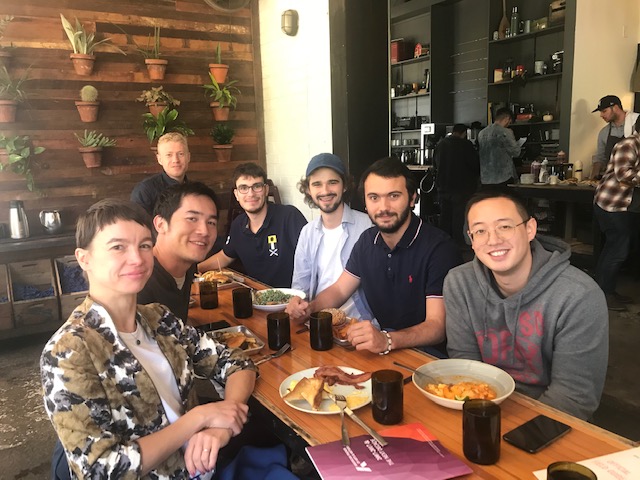
In Atlanta together with Nicolas Horde, Thomas Francois, Tanguy Passini, Alexis Cotterlaz et Hugo Hugo Hamon
Monday, Nov. 3, Paris
During last year AFAM’s off-site, support to gadzarts entrepreneurs was mentioned as one of the directions AFAM will take in the next decade. Thus, I met a few gadzarts entrepreneurs in Paris (and later in Aix-en-Provence) as well as visited the largest startup campus in the world – Station F.
Nicolas Muron, founder of Moonbikes startup incubated at Arts et Métiers incubator was one of the gadzarts entrepreneurs I got acquainted with in Paris.
Moonbikes is making ultra-light electric snow vehicles. Nicolas is currently raising funds to move his business forward and is now looking for an US-based partner linked to the mobility sector.
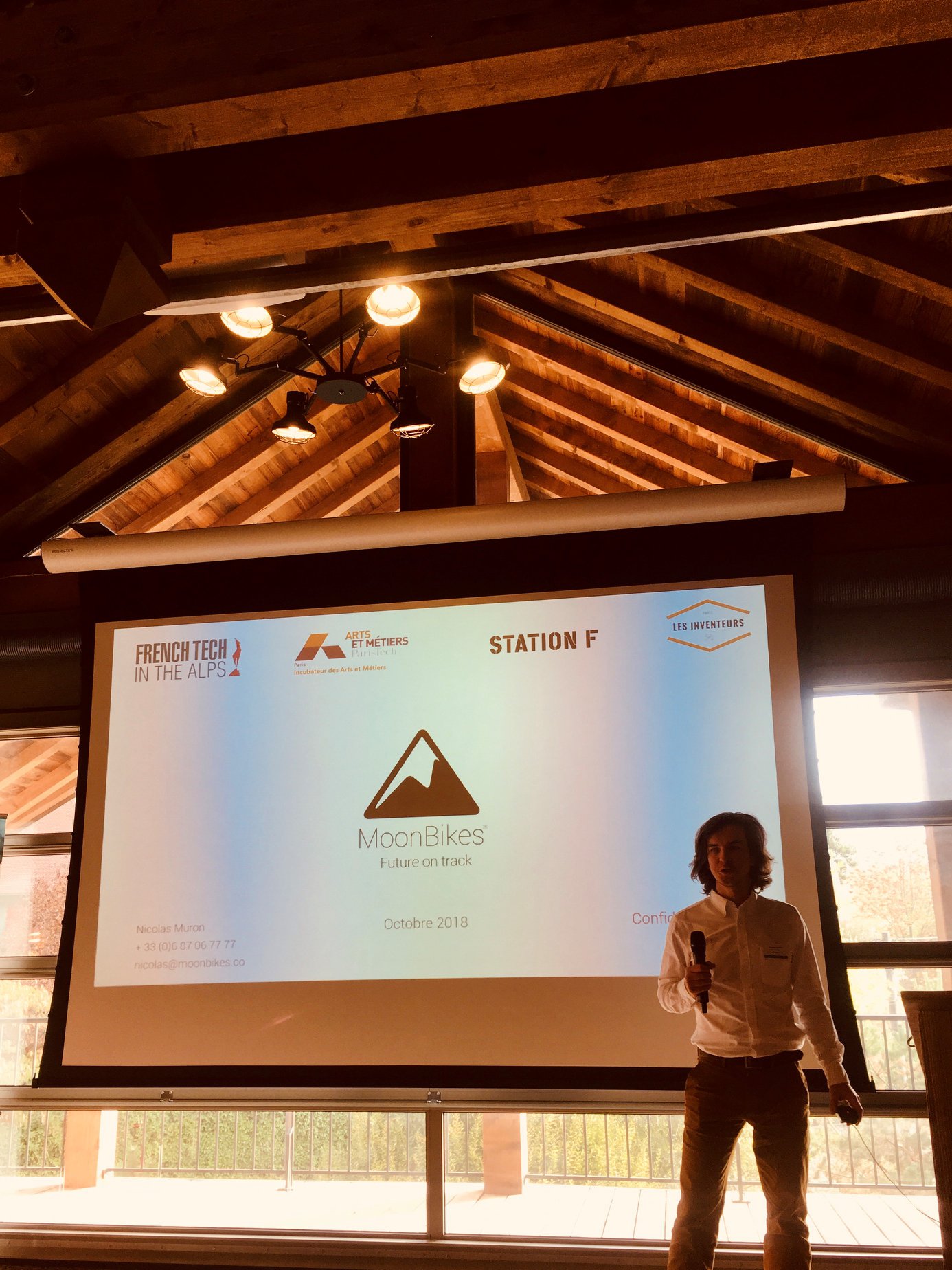
Photo courtesy of Moonbikes: Nicolas Muron on stage during his startup’s presentation in Chambéry in 2018
I also met Ryan Lober and his partner Antoine Hoarau, co-founders at Fuzzy Logic Robotics. Ryan is one of the rare Americans who studied at Arts et Métiers and AFAM already wrote about him in 2013. Today Ryan is Parisian, founder and CEO of a B2B robotics startup with a mission to democratize industrial robotics by proposing user-friendly human-robot interfaces.
Fuzzy Logic Robotics is incubated at Agoranov, a public Science and Tech incubator based in Paris.
Together with American born and raised Ruth Lied, a new young and dynamic professor of English at Arts et Métiers Lille, I tested a Fuzzy Logic Robotics new software.
Ruth and I have organized several informational sessions with our US-based alumni for Lille students (by the way, Ryan Lober was one of those who kindly agreed to participate in these useful informational sessions). And we are looking for more alumni willing to share their expertise with our young gadz'arts.
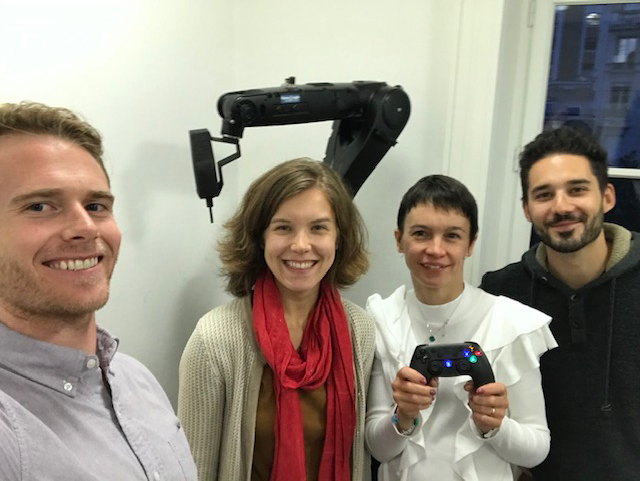
Ryan Lober, Ruth Lied, Antoine Hoarau and I at Fuzzy Logic Robotics
Tuesday Nov. 4, Paris
Tuesday, I continued discovering entrepreneurship ecosystem in Paris visiting station F. Station F is the biggest startup incubator in the world. It hosts big corporate entities, accelerators as well as more then 1000 innovative startups.
Arts &Métiers Acceleration (AMA) has also found its place on this unique entrepreneurship campus. I met Joël Saingré, General Manager at AMA and Gaël Buvat, Program Manager at AMA to talk about AFAM and A&M Acceleration presence at Station F.
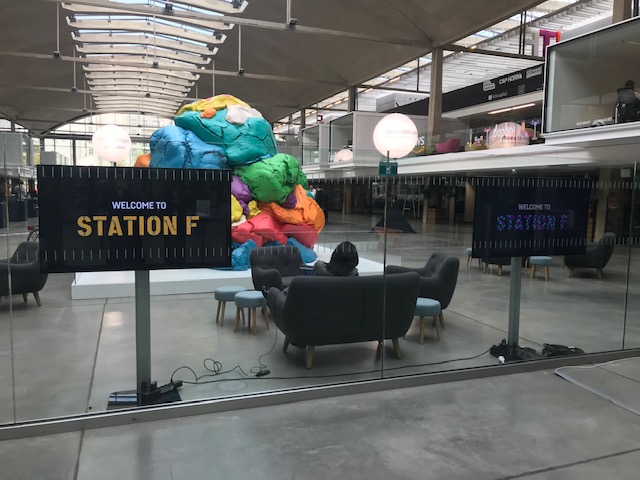
Sculpture by Jeff Koons behind "Welcome to Station F " sign
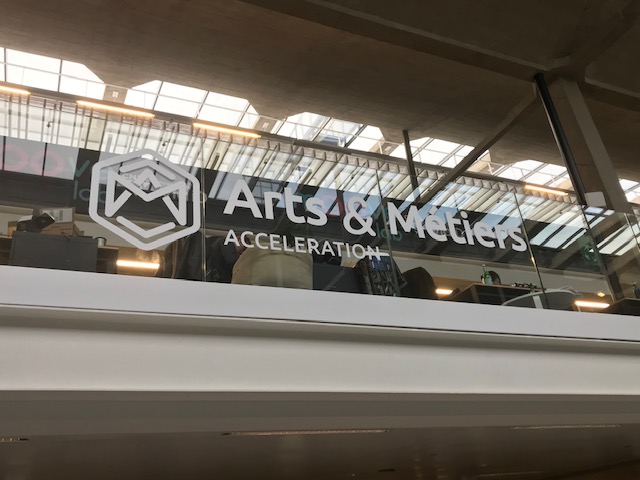
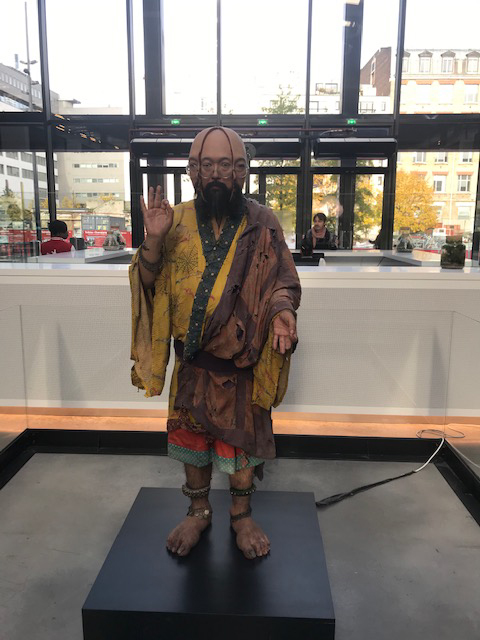
Tuesday was also dedicated to meetings with Arts et Métiers staff members. Two main highlights of the day were a meeting on the future of our Shasta internship program and a meeting with Sandra Cologne, in charge of Entrepreneurship and Innovation at Arts et Métiers.
Sandra’s goal is to support students-entrepreneurs helping them succeed in the new PEIE (Parcours Entrepreneurial and Innovation Technologique) cursus open to gadzarts-entrepreneurs at Arts et Métiers.
As to my first meeting – it was dedicated to the future of our main program – Shasta internship program. Together with Audrey Stewart (Director of International and European Development), Daniela Stelmaszyk (in charge of International Mobility), Mickael Rivette (Head of Corporqte Relations) and Jean-Yves Colombel (Career Department at la SOCE) we were looking into how to improve our current internship program and provide our students with more internship opportunities.
Wednesday, Nov. 5, Bordeaux
Campus of Paris is a mandatory passage on AFAM’s road. As to other campuses, every year AFAM Community Manager visits different campuses to present AFAM and Shasta program. This year the campuses of Bordeaux and Aix-en-Provence have been chosen as AFAM’s destinations (Lille and Metz were visited last year).
Bordeaux campus was welcoming and a lot of students assisted at the Shasta presentation.
Workshops' visit accompanied by Frédéric Lalardier was also on my agenda.
I witnessed Rooster’s production. The emblematic animal was being made in the lab at the time of my visit and was intended to be offered to Bordeaux’s Mayor the next day.
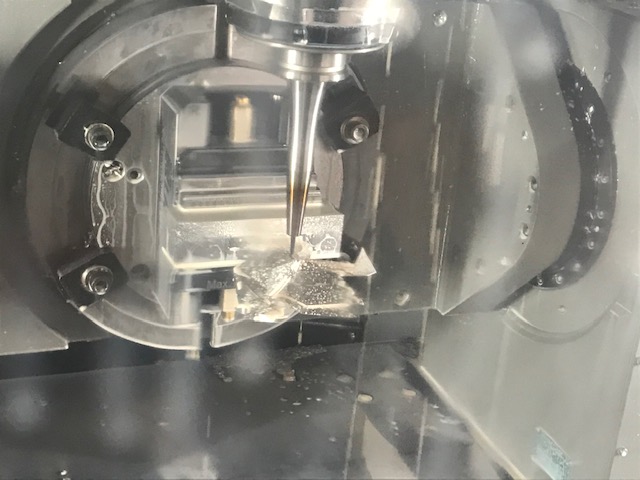
Production of the Rooster at Bordeaux campus on November 5th
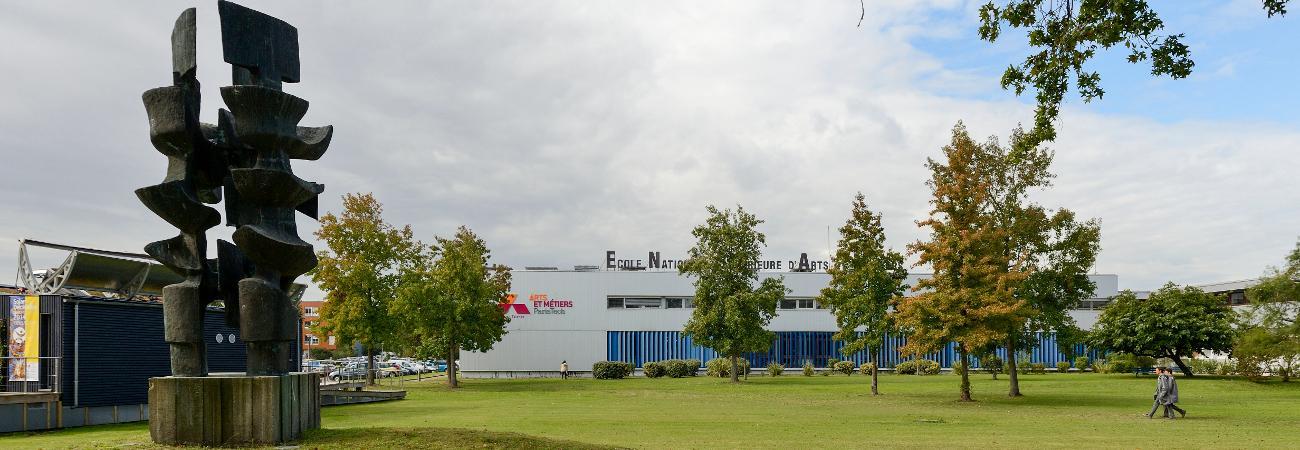
Bordeaux campus (picture: https://artsetmetiers.fr)
I met I2M laboratory’s director Jean-Christophe Batsale to discuss possible cooperation with American Universities.
I also had a detailed conversation with Valérie PERNOT at students affaires and corporate relations as well as with Catherine GOETZ, Professor, in charge of APE (accompagnement professionnel des étudiants) nationwide.
Catherine GOETZ welcomed the action taken by AFAM as to students’ guidance and preparation in the framework of the Shasta program.
Thursday, Nov. 5, Paris
Thursday was marked by a meeting with parcours US students guided on their way towards graduated studies in the US by Associate professor Michael Deligant and his team. Every year there are more than 30 students joining best American Engineering schools. All of them are considered part of our diverse community once they arrive in the US.
Our parcours US students have always been very active. Last two presidents of West Coast Group – Louis Renaux last year and Mattia Pelissou this year - are both UC Berkeley Graduates and Parcours US students. Our representative in Atlanta Nicolas Horde – is also a former parcours US student.
AFAM is looking forward to more new interesting projects and events co-organized with our young gadzarts.
This time our US parcours students were lucky to meet Charles-André Richard (Li 202), who came to Paris campus to talk about his experience in the US. Back to France this year, Charles-André became co-founder and CTO of Unkle, a startup revolutionizing French Rental Market today.
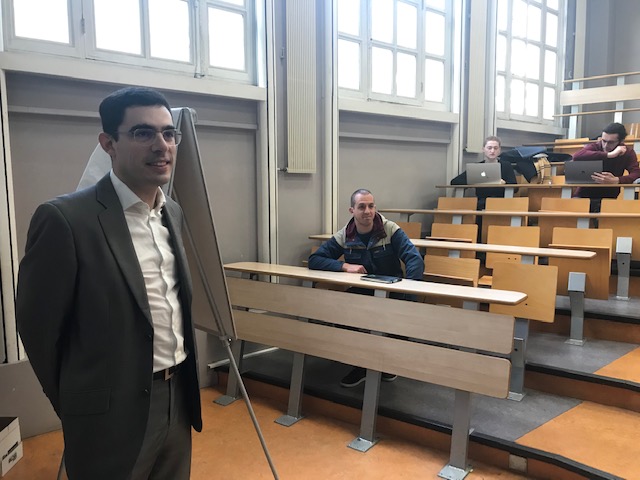
Charles-André Richard presenting his American journey in front of Parcours US students
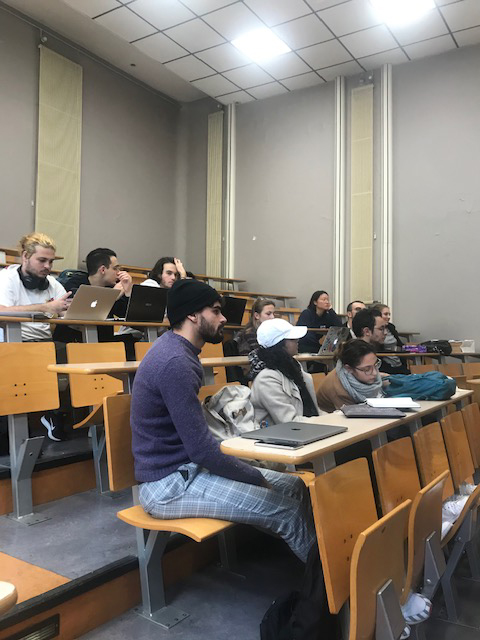
Parcours US students
Friday, Nov. 6, Aix-en-Provence
Friday has been spent on Aix-en-Provence campus which as you might know is building a fulfilling partnership with Texas A&M.
I arrived on campus along with Eric Didier (Ch 83), co-founder and COO of Comet. Eric has been living in Boston and then SF Bay Area for 8 years before moving to the sunny Aix-en-Provence area in 2018.
A day started with a very warm welcome and constructive meeting with a campus Director – Philippe Collot.
By 11 am an amphitheater was already full with 1 and 2nd year students interested in AFAM, Shasta internship program and Eric’s testimony about his American journey.
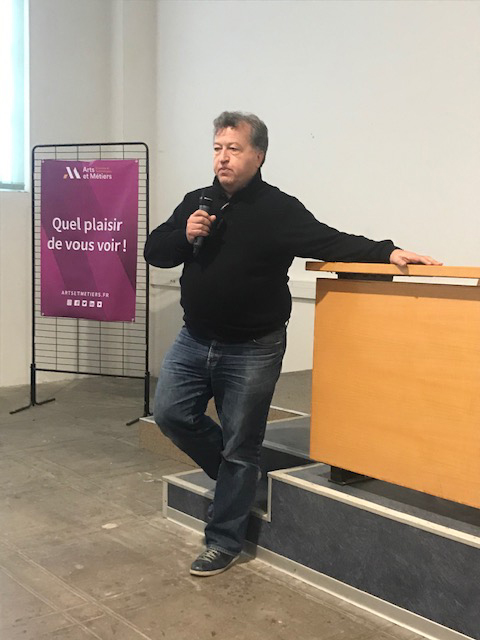
Eric Didier in front of Aix-en-Provence's first and second year students
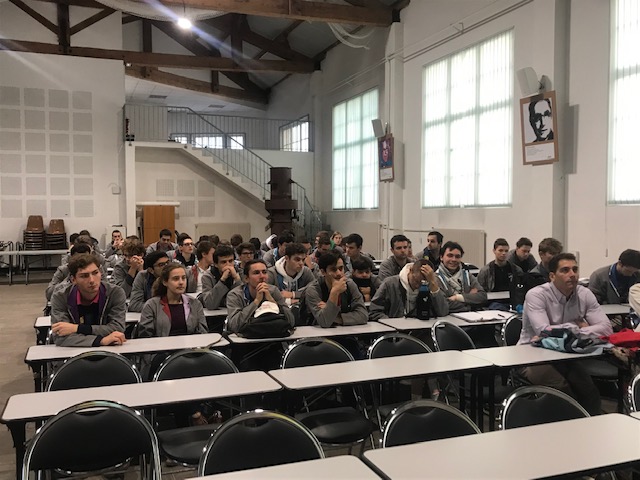
Photo: Aix-en-Provence students
The Shasta meeting followed by a working lunch with Philippe Collot, Laurent Barralier, (Professor at MSMP laboratory), Regis Kubler (Associate Professor) and Laurence Combarieu (Deputy Director at MSMP laboratory).
Two meetings occurred in Aix were in line with a new entrepreneurship direction AFAM took.
I met Benjamin Tardieu (Ai 208) whose entrepreneurship trip AFAM has been following for a little while now. Benjamin is a Founder and CEO of GetBackSports, a sports tech startup.
Benjamin was able to take part in several individual sessions with Aix students together with me sharing his experience and encouraging students to get a professional experience abroad. Benjamin himself spent a year working in the United States before starting his entrepreneurship adventure.
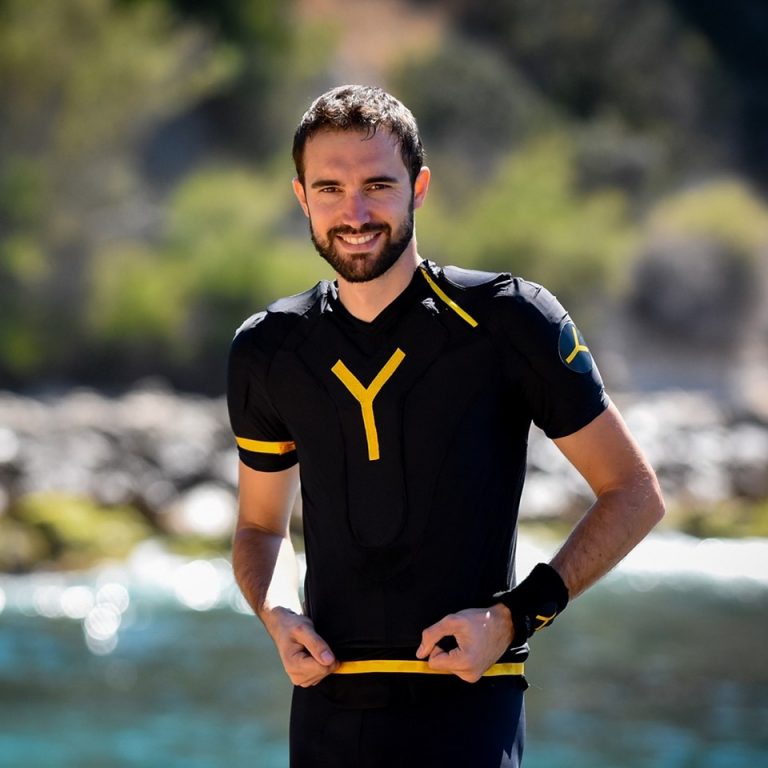
Benjamin Tardieu wearing GetBack T-shirt (photo by William Cannarella)
The second meeting was a complete surprise (very pleasant too). I met a COO of Sikiio, Nicolas Ract (Ai 92). Sikiio offers a multisensory experience in a well-being area. Sikiio is on the road now travelling through France and showing its innovative well-being concept.
If you see a pink truck under your window, come say hello to Nicolas and take a moment to sit in the magic Sikiio chair to forget about all your worries and problems.
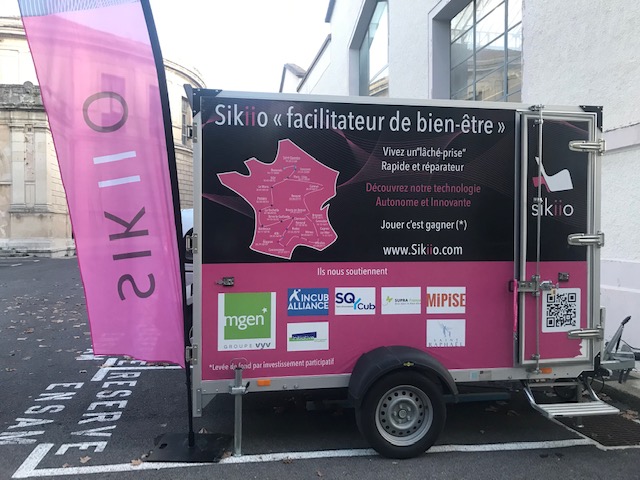
Sikiio trailer on Aix-en-Provence campus
My week in France was full of interesting meetings and discussions and hopefully, AFAM will have even more exciting projects on the horizon and we will be able to provide our students and alumni with more help and support in their American journey.
See you next year!
Albina Patou-Chebykina,
Your AFAM Community Manager
- Details
Houston is one of the most dynamic gadz'arts groups in the United Stated with more than 60 active members of the community.
The partnership between 2 schools - Arts et Métiers and Texas A&M - known today as AM² Transatlantic partnership, may make the life of Houston gadz'arts community even more dynamic.
In February General Consulate of France in Houston together with Texas A&M and Arts et Métiers co-organize a French American Innovation Days (FAID) conference on Smart Manufacturing and AI for Industry 4.0
Houston Gadz'arts group members are invited to take part in this conference on Smart Manufacturing.
For more details about the event please click here
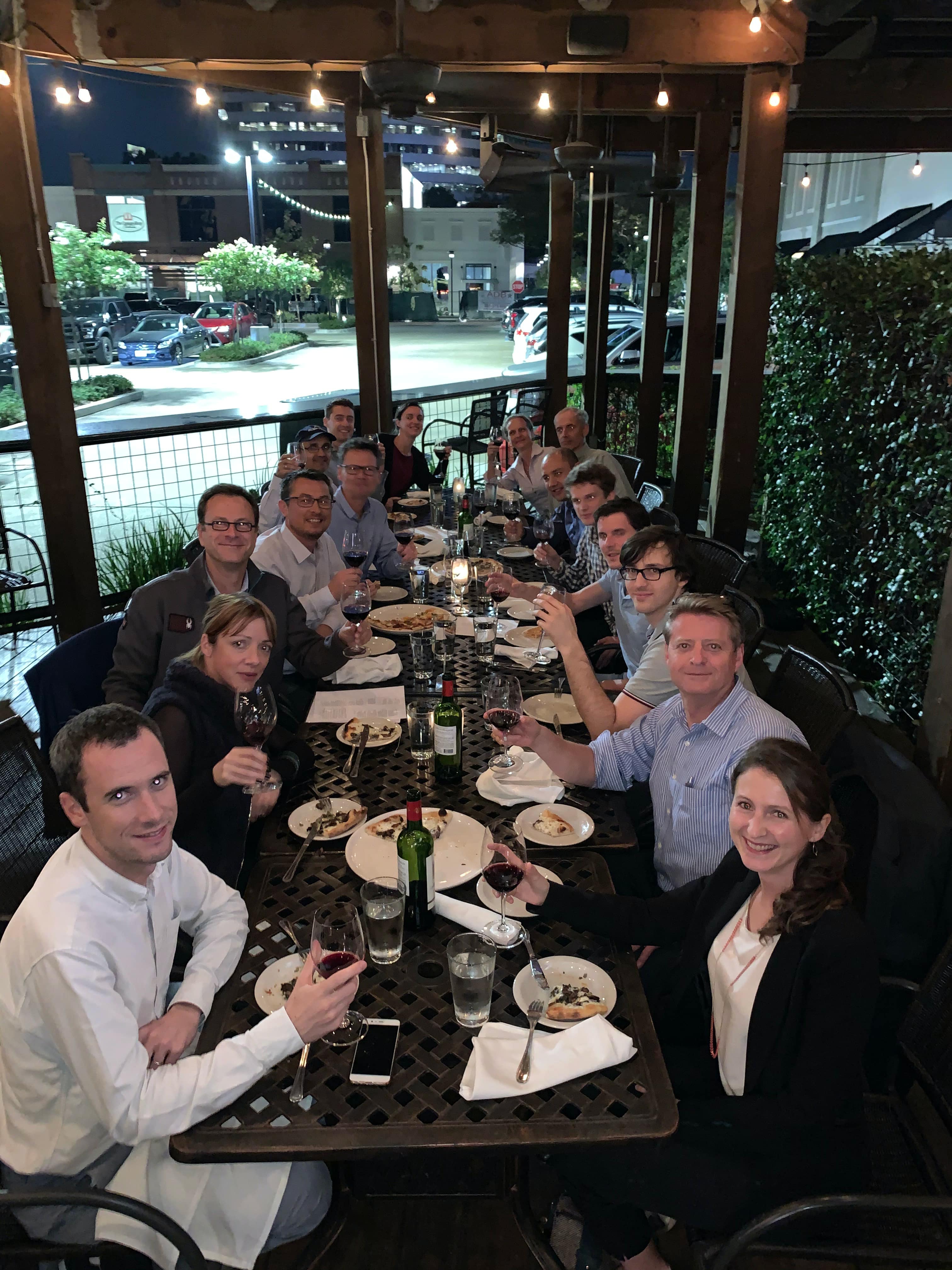
Gadzarts during the latest gathering in November in Houston
- Details
On November 20th AFAM's first event co-organized together with French Founders took place in Palo Alto. "The Mobility Revolution: Disruptions and Opportunities Ahead" was the theme of the panel discussion followed by networking. The event was kindly hosted by Bank of the West.
About 40 entrepreneurs, French Founders members, professionals of the mobility and other sectors actively participated in the discussion. Several gadz'arts based in the Bay Area were at the event: AFAM's president Eric Benhamou, Moonbikes' founder Nicolas Muron and Olivier Clerc @BloomEnergy, to mention a few. AFAM would like to thank Alexandre Bejaoui, Directeur Californie du Nord @French Founders for the excellent organization and coordination of the event. Big thanks go to our panelists Christophe Soudier @Nio, Guillaume Perronet @Faurecia North America et Pierre Maillot @Robert Bosch North America as well as to our moderator Marc Amblard, Managing Partner @Orsay Consulting for helping the audience explore this exciting topic.
Besides being a Mobility Expert, Marc Amblard (Cl 84) is a CFO of AFAM since 2017. Here is what Marc said about the past event:
"The hour of discussion with the French panelists from Faurecia, Bosch and Nio went by so fast. We tried to cover as much as possible of the profound transformation impacting mobility. We only managed to address a few of the many things that are happening as parts of four megatrends, i.e. electrification, autonomous driving, shared mobility and connected vehicles. I was impressed by the level of engagement from the audience. We could have gone on for several hours. The panel discussion was followed with great networking. Thanks again to the panelists, our partner FrenchFounders and our host Bank of the West."
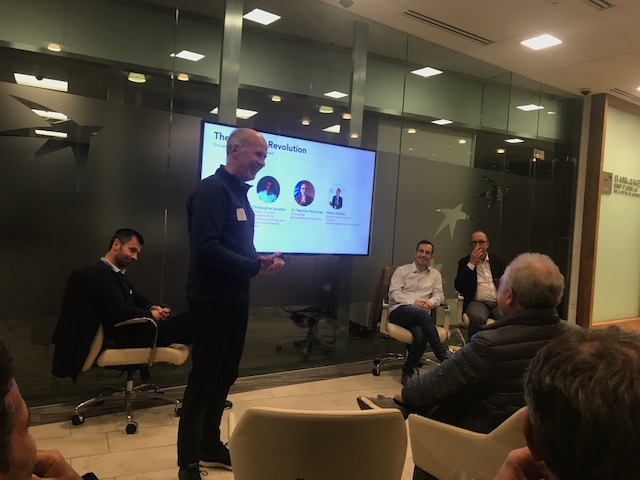
Marc Amblard starts the discussion. Behind him the panelists: Pierre Maillot, Christophe Soudier et Guillaume Perronet
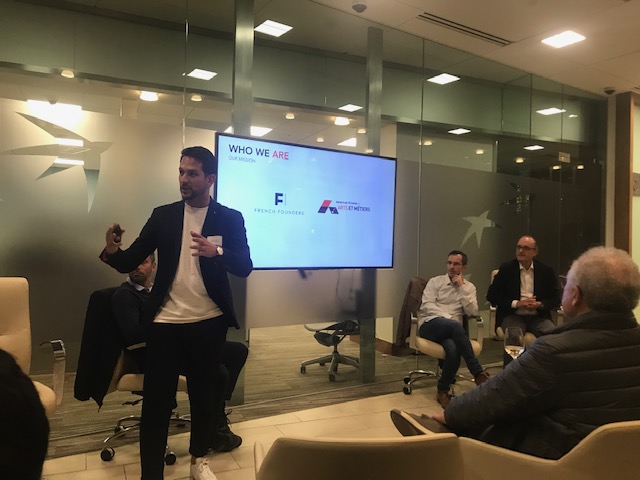
Alexandre Bejaoui talks about French Founders and their global initiatives
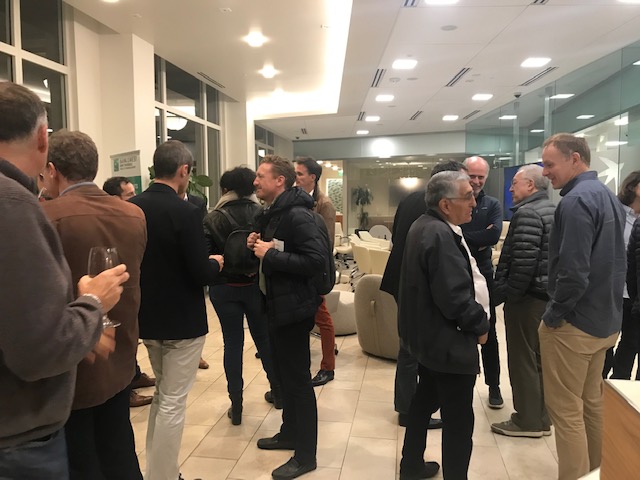
Networking
About French Founders:
French Founders is the first Business Club of French-speaking leaders, entrepreneurs, CEOs, top executives everywhere in the world. French Founders in the USA is most active in NYC, Miami, LA and SF bay area. The Club will open its activities in Seattle soon. To know more about French Founders and to join the club, click here.
- Details
AFAM continues its interview series "Food for Thought" and today our guest is Pierre-Edouard Brasseur (Li 208) who will talk about his experience working in Oakland, CA for Impossible Foods as a Continuous Improvement Engineer.
AFAM: Hello, Pierre-Edouard, and thank you for taking the time to share your expertise with our blog readers. Your job title is Continuous Improvement Engineer for Impossible Foods. What does it mean exactly and what do you do in a daily basis for your job?
Pierre-Edouard: My main role is to help with improving the performance of the equipment we use to manufacture the Impossible Burger, to ensure that the meat we produce in our Oakland facility is top quality. This involves a number of projects where I work with a cross functional team made up of people from production, maintenance, quality, sanitation and more.
On a daily basis, I study and measure our production output and how this can be continuously improved. I also spend around 30% of my time on the floor of our manufacturing facility. I also work closely with our suppliers and our maintenance team to improve the performance of our equipment.
AFAM: Is working in the food industry your initial choice or a coincidence?
Pierre-Edouard: I lived in France until December 2018 and worked for ArcelorMittal, the world steel leader, where I was a mechanical workshop manager. During this time, I learned a lot about maintenance management, mechanics, repairs, people management, and project management in general.
Once I decided to come to the United States, I knew I wanted to work in a maintenance role or a project management role. I knew I wanted to live in San Francisco, and therefore I knew my options in the manufacturing industry were somewhat limited. The food industry seemed like a natural step, and I am thrilled to have this great opportunity to work for Impossible Foods.
AFAM: What makes the company you work for unique?
Pierre-Edouard: Impossible Foods’ mission is to transform the global food system to support the planet and growing human population. Our goal is to replace animals as a food production technology by 2035, and provide consumers with meat, fish, and dairy foods that are good for both people and the planet.
Impossible Foods is unique in its committed focus to its mission: to completely transform the food system to feed a growing population. We’re using a product to have a meaningful impact on the environment. The Impossible Burger, compared to a traditional burger from cows, uses 96% less land, 87% less water and creates 89% less greenhouse gas emissions. From a consumer perspective, this means that when a consumer chooses an Impossible Burger over a conventional beef burger, they save the greenhouse gases of the average American's drive to work, 73 square feet of land for nature and 170 water bottles worth of fresh water.
One of the most exciting things for me in working at Impossible Foods, is the opportunity to be part of an industry that’s expanding incredibly quickly.
AFAM: Did the fact of being French help you get where you are now?
Pierre-Edouard:
My background and my experience leading up to now has helped prepare me a lot for where I am today. But the fact of being French did not necessarily help me. It was a challenge for me at the beginning to get used to the American accent, but this is a great opportunity to improve my English, and I am getting better.
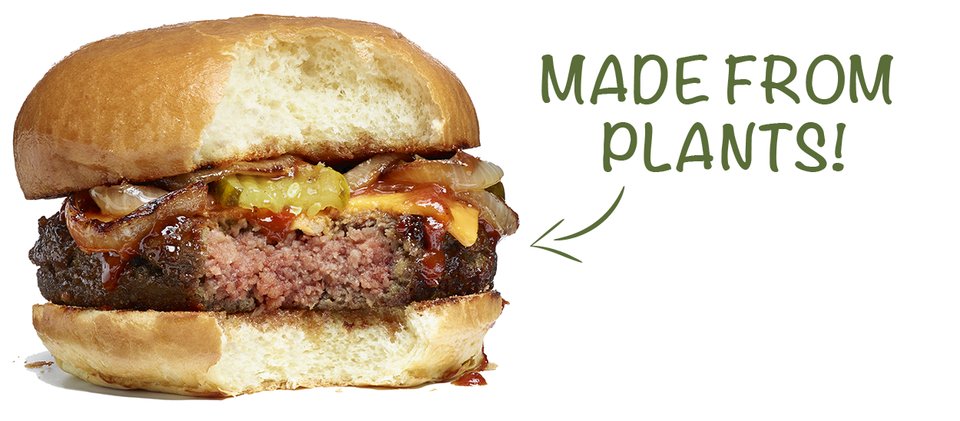
Picture credit: chicagocrusader.com
Read other interviews of Food for Thought series in our blog:
Interview with Guilhem Bau (Cl 215), 6Dbytes
Interview with Jérémy Berros (Li 206), Pellenc Group
Interview with Florian Héraud (Bo 215), Epi Breads
Interview with Jean Prévot (Ch 98), Danone Manifesto Ventures
- Details
The Arts et Métiers community in the United States joins with others who are paying tribute to one of our most distinguished alumni with exceptional career achievements, Louis Magne (An 130).
This loss is most acutely felt here in the United States where he has been living for many years, as well as in France where the residence for students on the campus of Angers was named after him. Louis Magne shared his faith in younger generations broadly. He helped them follow in his foot steps and add an American experience to their Gadz’Arts foundation. He remained close to his alma mater through his long life. Louis Magne’s grant supported many young Gadz’Arts coming to the United States to study in the best American Universities and will continue in the future.
AFAM’s work would not have been as successful if it wasn’t for the continuous support of Louis Magne. His sizable grant to AFAM helped expand our programs across the United States for Arts et Métiers alumni and students alike. We are grateful for his generosity. Louis Magne lived a life of leadership and service and will be remembered.
Louis Magne was born in St. Pierre de Frugie, in the Aquitaine region, near Dordogne, France, in 1912, he graduated in 1935 and joined Schlumberger as a field engineer. After some training in Rumania, Magne started his career in Venezuela working in Lagunillas for Shell, on land. Then he continued in Trinidad. Magne had met Conrad Schlumberger in person in Paris for an interview.
In the 60’s Louis Magne was Executive Vice President of Schumberger Overseas in Paris. Roland Genin was his assistant as VP Operations.
In 1967 Louis Magne was elected President of Schlumberger Surenco in Caracas, Venezuela. Magne remained in Caracas until December 1970, when he moved back to Houston for Schlumberger Limited. From 1972 to 1977 Magne was President of Schlumberger Wireline North America.
Louis Magne retired in Houston, Texas, where he maintained a socially active life with his close friends until nearly reaching the age of 107. He died in the morning of October 29, 2019.
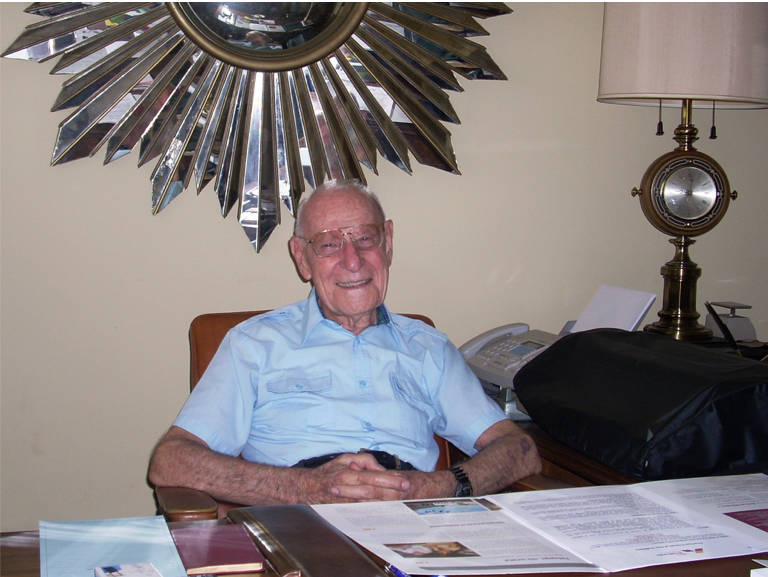
Photo: Courtesy of Arts et Métiers
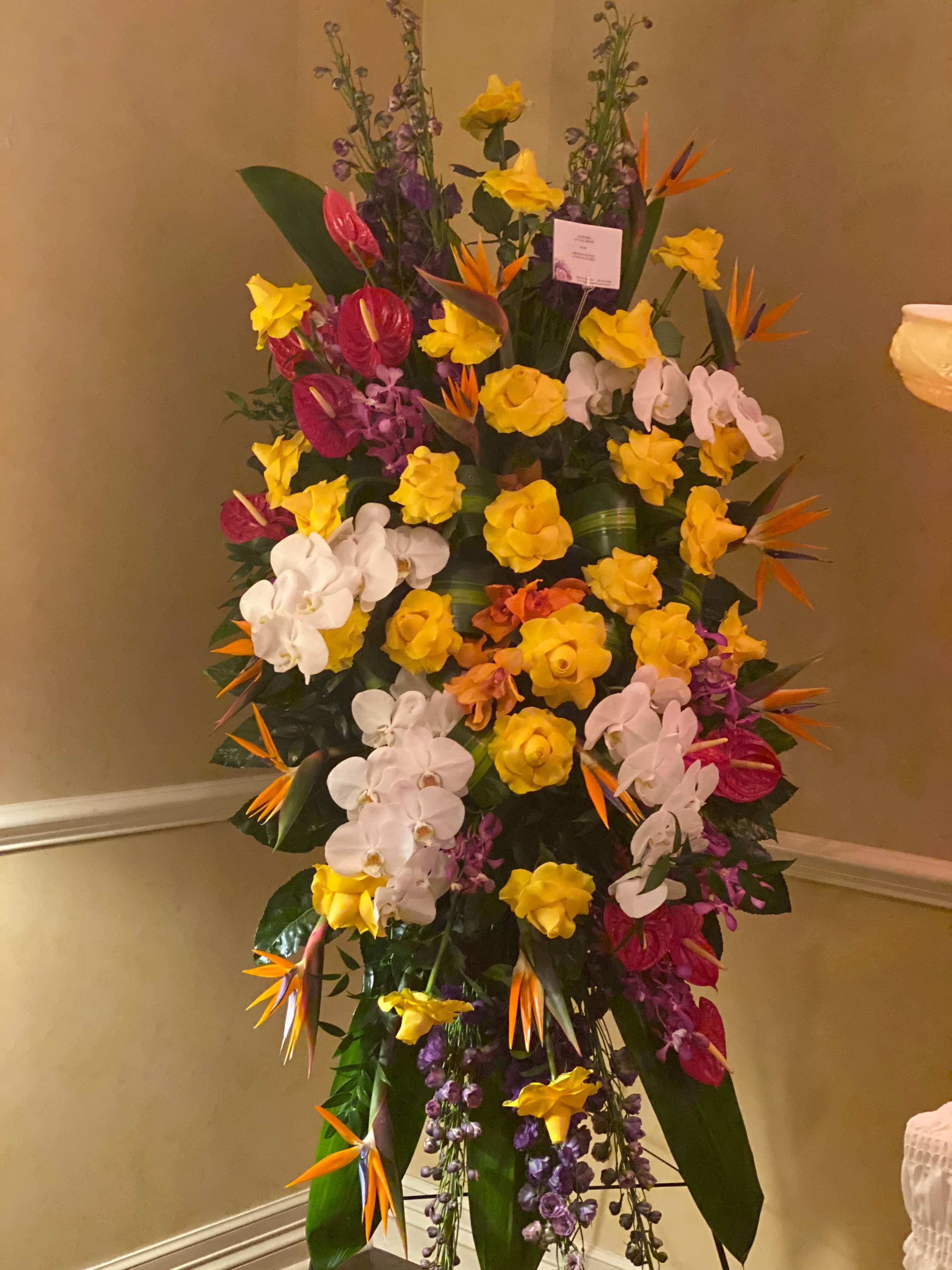
Flowers on behalf of AFAM in memory of Louis Magne at a funeral ceremony in Houston. A small group of gadzarts based in Houston led by Eric Tran, Central Group president, was present to say goodbye to the Grand Gadzart.

 BLOG /
BLOG /  CALENDAR /
CALENDAR /  DONATIONS /
DONATIONS /  MENTORS /
MENTORS /